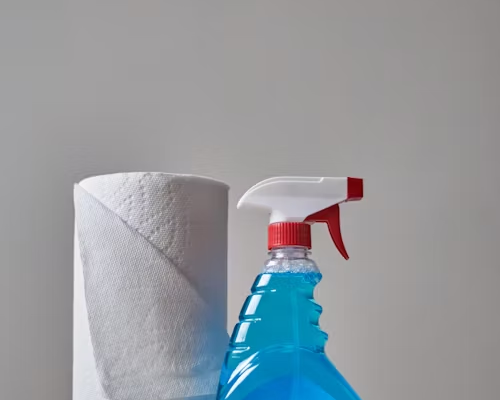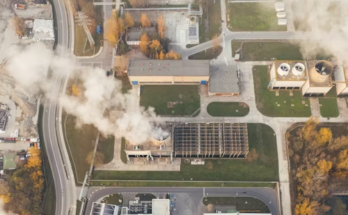Making homemade cleaners can be an easy, quick, and cost-effective way to reduce harmful chemicals in the home.

Avoid toxic cleaning products; these could potentially lead to respiratory and skin irritation issues. Instead, opt for eco-friendly alternatives that are safe.
Shop for eco-friendly brands that are transparent about their ingredients. Check out Ecover, for example; it is Leaping Bunny certified and operates a zero-waste factory!
All-Purpose Cleanser
All-purpose cleaners serve as indispensable kitchen and bathroom essentials, effectively removing grime, grease, and light stains without the need for heavy scrubbing. Most all-purpose cleaners contain surfactants (soap-like molecules that produce suds), water softeners, and fragrances that are safe for most surfaces and may even disinfect in certain cases (when selecting disinfection solutions, make sure they have FDA approval to kill bacteria and viruses).
Stores sell green cleaners, but you can also easily make your own at home. Most likely, you already have all of the ingredients necessary for making an all-purpose cleaner in your pantry; club soda can help break down greasy residue, while cleaning vinegar can deodorize and disinfect (just watch out for strong acidity when used on marble or granite countertops!). Natural dish-washing liquids contain mild surfactants that are gentle enough for sensitive skin; look out for ones without synthetic dyes, perfumes, or preservatives when selecting dish-washing liquids without synthetic dyes, perfumes, or preservatives added from store-bought brands!
Rubbing alcohol (also known as surgical spirits or methylated spirits) is an excellent disinfectant and shine enhancer when added to homemade cleaners. Be sure to purchase pure brands without additional colors or scents, and only use 70% concentration when making homemade cleaners; higher concentrations could damage wood surfaces and finishes.
Essential oils are popular additions to homemade cleaners and add a pleasant scent, but beware—some people with environmental sensitivities could find them irritating and cause adverse reactions. When selecting essential oils, make sure they’re safe for your environment, and always dilute them first with water before use.
Distilled water is ideal for creating homemade cleaners as it doesn’t contain contaminants that might compromise their effectiveness. If distilled water is unavailable, consider using filtered or spring water instead.
Make an all-purpose cleaner quickly and efficiently by mixing equal parts rubbing alcohol and water in a spray bottle, adding two teaspoons each of baking soda and lemon juice or extract for shine and lemon extract for scent, as well as 1 teaspoon of borax (for soap scum removal). For glass cleaning purposes, simply substitute vinegar for equal parts distilled water or ammonia.
Window Cleaner
Cleaning products designed specifically for windows and glass-top tables can leave behind a streak-free shine and remove greasy smudges without adding harmful chemicals to your home environment. Furthermore, these eco-friendly cleaners reduce chemical exposure in your home as well as fumes from store-bought varieties, which could irritate sensitive noses, eyes, and throats.
Simply mix one part distilled white vinegar with 10 parts water in a spray bottle to easily clean most windows and glass surfaces. For added scent, try sprinkling in some essential oils, such as lemongrass, peppermint, or tea tree essential oil drops.
Rubbing alcohol is an eco-friendly cleaner that is safe to use on glass surfaces, offering a quick solution for breaking down stubborn grease and fingerprints while leaving behind no stains or smells—an ideal choice for windows, glass-top tables, or mirrors. Furthermore, its quick evaporation time makes it the ideal solution to quickly eliminate sticky residue left by price tags, labels, or tape that tend to attach themselves to it and collect dirt over time.
Vinegar contains naturally occurring acetic acid that’s effective at clearing away grime from surfaces without leaving streaks on glass, such as windows. To use, simply mix equal parts water and vinegar in a spray bottle and shake well. Adding your preferred essential oil drops, up to 10–15 drops, may give an aromatic scent; however, this shouldn’t become overpoweringly strong!
To achieve optimal results, apply cleaner with a lint-free cloth like a microfiber towel or chamois before following up with an effective window squeegee, like this top-rated Amazon option. When cleaning windows, begin at the top corner and move towards horizontal strokes; wet the corner of the squeegee before applying it directly onto glass surfaces before regularly rinsing to remove buildup, and rinse regularly thereafter to maintain clear windows. You should also add a wax coating twice annually to protect frames from moisture while preventing smudges and streaks from appearing over time. See this great Amazon option available now for optimal results!
Dish Soap
Are you trying to reduce the chemicals in your home and on your hands? Creating your own liquid dish soap might be the solution! Not only is it much less costly than buying store-bought varieties, but making your own ensures you know exactly what ingredients go into the cleaner. Plus, you can tailor it exactly according to your own needs!
Though there are eco-friendly dish soaps on the market, many contain ingredients that could be hazardous to both the environment and your health (like formaldehyde and triclosan). Plus, they tend to be more costly than non-toxic brands, often coming with strong vinegar scents that make using them unpleasant (or smell like toilet paper).
At home, it is possible to craft natural homemade dish soap using simple ingredients—and the best part? It works just as effectively!
This recipe uses grated bar soap as its foundation, easily available at most stores (you could also make your own cold-process soap to save money). This solution makes an excellent cleaning tool because of its low-sudsing formula that works in hot or cold water, gentle yet long-lasting skin protection properties, and customizability options such as choosing your fragrance!
To make soap, combine grated soap and water in a pot on the stove, stirring frequently while heating. Avoid letting it come to a boil as soon as it starts melting, then pour into an appropriate container (e.g., a glass ramekin or an old soap dispenser) for storage.
Once your soap has cooled down, add essential oils and mix well. Pour it into your chosen container, and you’re good to go. Homemade dish soap may not last as long, but it is still an effective way to reduce chemicals in your home and waste.
Though this homemade soap might not produce quite the same lather as store-bought options, it still leaves dishes and hands feeling clean and fresh. Furthermore, if you are sensitive to chemicals found in liquid hand soap products available commercially, then homemade options could provide an ideal solution.
Laundry Detergent
As you stroll the laundry aisle of your grocery store, chances are you’re likely surrounded by colorful detergent bottles made of thick plastic that may or may not be recyclable—an estimated 700 million end up in landfills each year!
Crafting your own laundry detergent is both eco-friendly and cost-saving, providing a great way to avoid toxic chemicals found in commercial detergents, such as sodium tripolyphosphate (STPP), classified by the Environmental Working Group as a moderate human health risk. Borax and liquid castile soap may already be in your pantry, so making homemade natural laundry detergent should be easy!
You could even make your laundry detergent recipe without bar soap, which would make it easier for essential oils to freshen your clothes without running the risk of accidentally adding synthetic fragrances containing phthalates, allergens, or other irritants.
Simple and safe ingredients, such as borax for stain removal and baking soda for brightening and deodorizing, are used in this laundry detergent. You could also try adding essential oil drops to fragrance boosters for an added scent boost!
To make your own homemade laundry detergent, start by grating one bar of pure soap, such as Zote or Ivory, into 1 cup of flakes using a box grater and mixing it with 2 cups each of borax and washing soda in a 5-gallon bucket. Once you’ve fully disintegrated all the components, add 28 cups of boiling water to your container and stir again, allowing it to sit and gel completely for 24 hours.
This detergent works in both hot and cold water, is gentle enough for babies and sensitive skin, is free from dyes, perfumes, chlorine, phosphates, and artificial preservatives, is dermatologist-tested and hypoallergenic, is Biologo-certified, septic tank-safe, and vegan-friendly, and even meets Biologo criteria!




